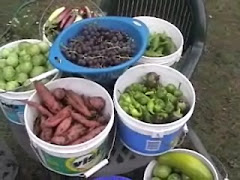 We have a weakness for nuts - I mean we really crave them. I suppose you could say that we are nut-a-holics. In amongst the fruit trees in our little orchard there are also hazelnuts, black and English walnuts. The only problem is that the hazelnuts will not start producing until this fall and the walnuts are still in their infancy. Mrs. H has decided that we will be adding almonds and more hazelnuts this year, but a big nut harvest is still many years away.
We have a weakness for nuts - I mean we really crave them. I suppose you could say that we are nut-a-holics. In amongst the fruit trees in our little orchard there are also hazelnuts, black and English walnuts. The only problem is that the hazelnuts will not start producing until this fall and the walnuts are still in their infancy. Mrs. H has decided that we will be adding almonds and more hazelnuts this year, but a big nut harvest is still many years away.
This fall we bartered eggs and some cash for around 50 lbs of unshelled English walnuts that we hoped would get us through until spring, though they are going fast. My wife picked up another 15 or so pounds of black walnuts from a neighbor who did not want them. We are realizing why now as they taste pretty strong and are next to impossible to shell. After removing the outer husk the nuts were set about the fireplace to dry for a few weeks and are now quite edible.... well the English walnuts anyway.

So we caved in and bought a can of peanuts the other day, not organic as those are impossible to find in our area. I got to thinking about the on-going salmonella outbreak in peanut butter and decided to check it out and see just what it is they do to the peanuts before they leave the field as far as pesticides go. We are usually very careful of late about the few (mostly condiment) food items we still purchase and whether they are organic (supposedly chemical free) or not. So I thought that since they are a legume that grows under ground hopefully they are not sprayed all that much. To my dismay, the first article I came across talked about how they are one of the most carcinogenic and pesticide contaminated food items out there and that's just one of the problems with peanuts.
http://www.thatsfit.ca/2009/05/19/the-problem-with-peanuts/

I did a little research and found insecticide products commonly used on peanuts include phorate, methomyl, esfenvalerate, cyhalothrin, carbaryl, acephate, azadirachtin, cyfluthrin, diflubenzuron, disulfoton, fenpropathrin, indoxacarb, propargite, pyrethrins , rotenone, spinosad, sulfur, and zeta-cypermethrin. As near as I can tell these are all still in use today, it is hard to keep track of what has been banned, is still in use, and what the new poison of the day is.
 Here is some info on the first one in the list, the rest are not much better.
Here is some info on the first one in the list, the rest are not much better.Phorate - Approximately 3 million pounds are used in the U.S. annually, 80% of which is applied to corn, potatoes, and cotton. Phorate is a 'restricted use pesticide' due to high dermal, oral, and inhalation toxicity. Toxic to fish, birds, and not so good for humans either.
The Phorate response in peanuts remains a mystery to researchers.
http://www.peanutgrower.com/home/2003_AprilPhorate.html
A mystery no longer -
Pesticide Spray Proves Disastrous In Salkiana Village, Jalandhar
http://www.countercurrents.org/en-kvm040806.htm
Tea / Bamboo Plantation Owners applied Phorate. Boy dies and over 40 people hospitalized
http://www.getipm.com/our-loved-ones/stories/india-phorate.htm
Pesticides May Up Asthma in Farm Women
http://www.webmd.com/asthma/news/20071228/pesticides-may-up-asthma-in-farm-women?src=RSS_PUBLIC
Thus my long standing love affair with the peanut has come to an end, I will bestow my affections upon a nut closer to home...after all, a peanut is just a lowly legume.

























3 comments:
Yeah, I'll pass on those too. Every day brings a new reminder of why I try to grow most of our food. Thanks for the informative post and for all the links.
Maybe the extreme nature of peanut allergies has more to do with the chemical used on them than the actual peanuts themselves. At any rate, I think I'll be buying almond butter for the kids in the future.
This is why I started eating organic pumpkin seed butter!
Post a Comment